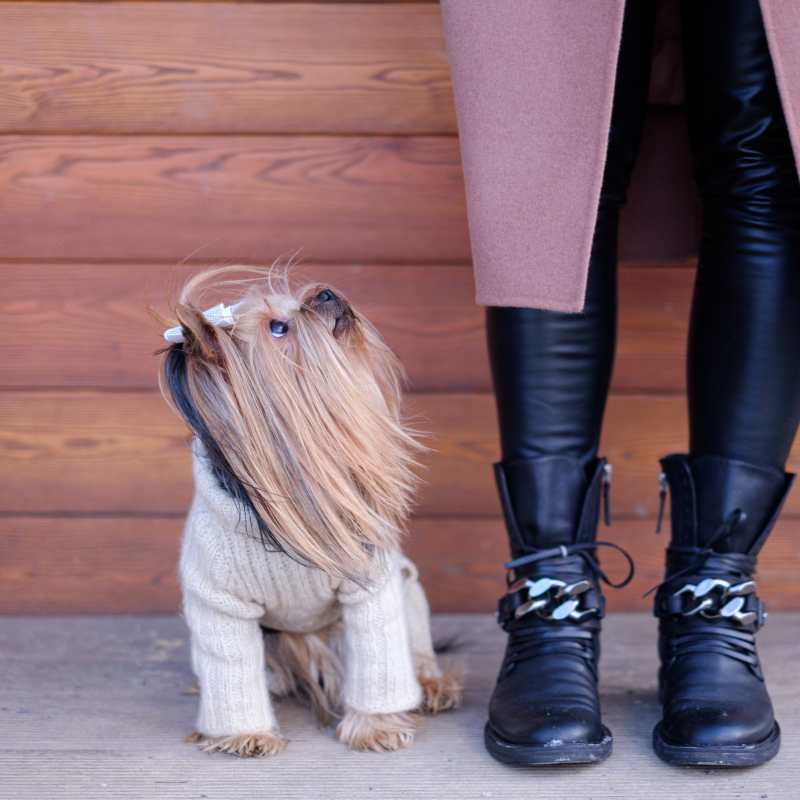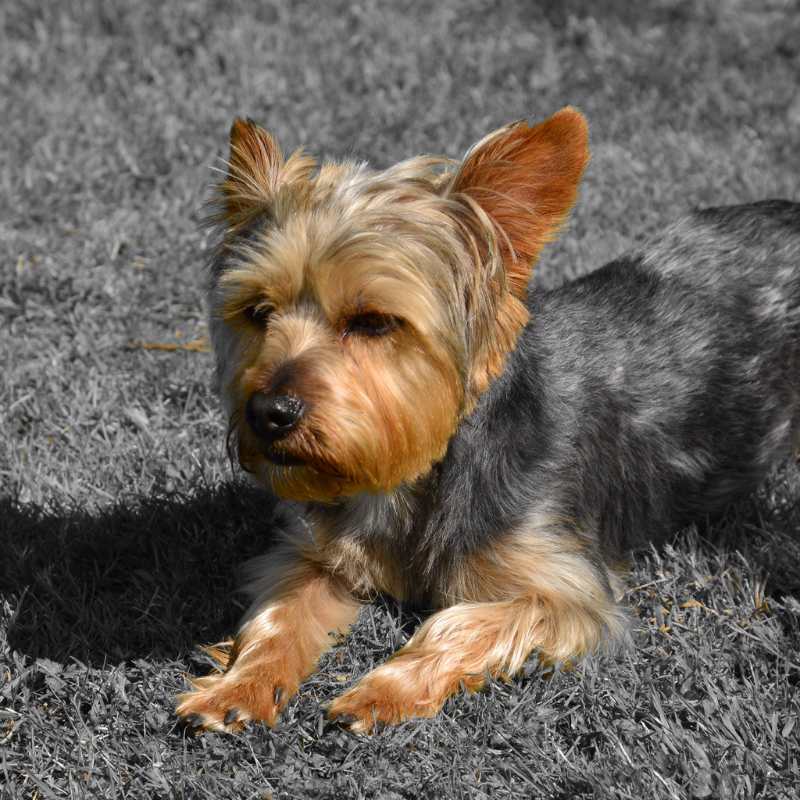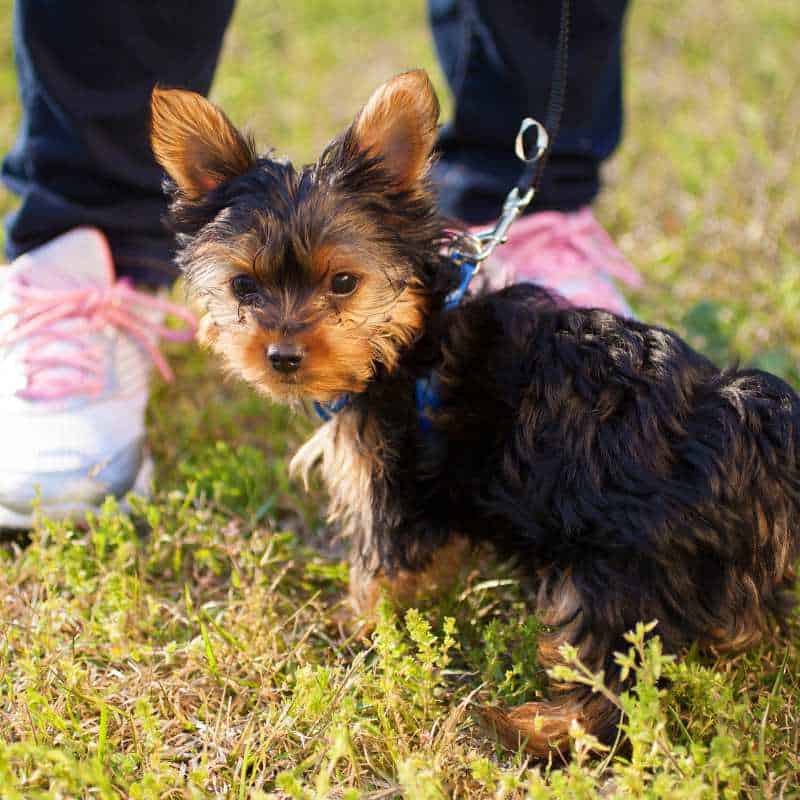Blog
What Are 3 Most Common Yorkie Knee Problems? Things To Know

I remember when my Yorkie, Bella, started limping and acting uncomfortable. At first, I was confused and worried. However, after some research and a trip to the vet, I found out she had a common Yorkie knee problem called luxating patella. In this post, I’ll go over the most common Yorkie knee problems, how to recognize them, treatment options, and how to manage them.
What Are Yorkie Knee Problems?
1. Luxating Patella (Kneecap Dislocation)
Luxating patella is one of the most common Yorkie knee problems and I experienced it with Bella. It’s when the kneecap (patella) slips out of place. You might see your Yorkie suddenly hopping or skipping on three legs. Sometimes the knee “pops out” and goes back in on its own but it can be painful and cause long term problems if not addressed.
Causes:
This can be genetic, meaning some Yorkies are born with shallow knee grooves and the kneecap is more likely to dislocate.
Symptoms to Watch For:
- Limping, especially in one leg
- Hopping or skipping while walking
- Sudden yelps of pain or discomfort
- Your Yorkie may avoid putting weight on one leg
How to Manage It:
Mild cases may not need surgery and can be managed with weight control, physical therapy and a Yorkie knee brace. But severe cases will require surgery to keep the kneecap in place.
2. ACL Tears (Anterior Cruciate Ligament Tear)
ACL tears are another common Yorkie knee problem and can be very painful and debilitating.
The Anterior Cruciate Ligament (ACL) is a vital ligament that stabilizes the knee joint, preventing the lower leg bone from moving too far forward. When the ACL is torn or damaged it compromises the knee’s stability and the dog will have difficulty walking or even standing on the affected leg. This can be very distressing for Yorkie owners as it often requires surgery and the recovery process can be long and challenging.
Causes:
ACL tears in Yorkies happen during activities that involve sudden movements or excessive stress on the knee joint. These injuries often happen when your Yorkie twists or hyperextends the knee, such as during running, jumping or playing.
Unfortunately, small dogs like Yorkies are more prone to ACL injuries especially if they already have other knee problems like luxating patella. Pre existing knee instability can make the ACL more prone to tears as the knee joint is already compromised.
Also, ACL tears can occur from repetitive stress on the knee over time. While Yorkies are small, their bursts of energy and playful nature can put stress on their joints especially during high impact activities. Overweight Yorkies are more prone to ACL tears as the extra weight adds more stress to their already fragile knee joints.
Symptoms:
If your Yorkie has an ACL tear, the symptoms are usually immediate and obvious. Here are some of them:
- Sudden Limping: One of the first signs of an ACL tear is sudden limping, usually in the back leg. Your Yorkie may start limping right after running or jumping or they may not use the leg at all.
- Swelling in the Knee Area: You may see swelling around the knee joint as ACL tears cause inflammation. The knee may look bigger than usual and your dog may show pain when you touch the area.
- Refusal to Use the Injured Leg: An ACL tear is extremely painful for your Yorkie to bear weight on the leg. Your Yorkie may hold the leg off the ground, avoiding any pressure on the knee. In more severe cases the dog may not stand or walk at all.
- Instability: If the ACL is completely torn your Yorkie may have trouble keeping the knee stable. This instability can cause the leg to “give out” when they try to walk or put weight on it and will make them more
Since these symptoms can also be present with other Yorkie knee problems, it’s best to get a proper diagnosis from a vet if you suspect an ACL tear. Ignoring the problem or delaying treatment can lead to further complications like arthritis in the knee joint making the injury harder to manage over time.
Treatment:
In most cases, an ACL tear in Yorkies will require surgery to repair the ligament and stabilize the knee. Unlike other knee injuries that can be managed with rest and physical therapy, ACL tears usually result to a complete rupture of the ligament.
- Surgical Repair: There are several surgical options but the most common are reconstructing the ligament to stabilize the joint. The vet may use sutures, grafts or synthetic materials to recreate the ligament and prevent excessive movement in the knee. The exact surgical approach will depend on the severity of the tear and the size of your Yorkie.
The cost of ACL surgery can vary greatly depending on the complexity of the case, location and the vet performing the procedure. Typically ACL surgery can cost from $1,500 to $4,000. This is a big expense but surgery is often necessary to get your Yorkie mobile and prevent long term pain.
Post-Surgery Recovery:
Recovery from an ACL tear can take weeks to months. Be sure to follow the vet’s instructions for rest and limited activity. Your Yorkie can’t run, jump or do any strenuous activity while the knee heals. Many vets recommend a Yorkie knee brace during the recovery period. A knee brace will support the joint as your Yorkie regains strength and mobility. The brace will stabilize the knee and prevent further injury during the healing process. Rehabilitation exercises under the guidance of a vet or physical therapist may also be part of the recovery plan to help strengthen and mobilize the affected leg.

Physical Therapy:
After the initial recovery phase, physical therapy may be recommended to get your Yorkie back to full function of the knee. Gentle walking and underwater treadmill therapy are controlled exercises that will strengthen the muscles around the knee and improve joint mobility without putting too much stress on the ligament.
Medications and Pain Management:
In the post-operative phase, your vet will likely prescribe pain meds and anti-inflammatory meds to keep your Yorkie comfortable. Be sure to manage your dog’s pain so they don’t overuse the injured leg or become too inactive.
Surgery is the most common treatment for ACL tears but in some less severe cases, conservative management may be attempted. This would be rest, meds and a knee brace to manage the injury without surgery. But this approach is generally less successful in the long term, especially if the tear is big.

Prevention:
Preventing ACL tears can be tough especially for Yorkies prone to knee issues, but here are a few things you can do.
- Healthy Weight: Keeping your Yorkie at an ideal weight is key to reducing stress on the joints. Extra weight can aggravate knee issues and increase the risk of an ACL tear.
- Controlled Exercise: While exercise is important, avoid high-impact activities like jumping from furniture or running on hard surfaces which can strain the knees. Gentle walks and controlled playtime are safer for your Yorkie.
- Joint Supplements: Supplements like glucosamine and chondroitin can help with joint health and reduce the risk of ligament injuries over time. These are especially helpful for older dogs or dogs.
Medial Collateral Ligament (MCL) Injuries
Medial Collateral Ligament (MCL) injuries are less common in Yorkies than luxating patella or ACL tears but can still be a big issue. The MCL is on the inner side of the knee and helps to stabilize the joint by preventing it from moving inward. When this ligament is injured it can cause pain, instability and mobility problems.

Causes:
MCL injuries are usually caused by trauma or a sudden twist in the knee. This can happen when your Yorkie lands awkwardly after jumping or playing or running. Dogs with pre-existing knee instability like luxating patella are more likely to MCL injury as their knee joints are already compromised. Repetitive stress on the knee especially in very active dogs can also cause MCL injury over time.
For Yorkies prone to other knee issues, even simple activities like running around the house or yard can cause MCL injury especially if the knee isn’t stable to begin with. This can also be caused by an accident like slipping on a smooth surface.
Symptoms:
The symptoms of MCL injury can vary depending on the degree of strain or tear. If your Yorkie has MCL injury, you may notice the following:
- Pain and Swelling on the Inside of the Knee: Inflammation and tenderness around the knee joint especially on the inner side is a clear sign of MCL injury. You may see your Yorkie flinching or pulling away when the area is touched.
- Wobbly or Unstable Leg Movements: Since MCL helps stabilize the knee, an injury can make the leg feel unstable. You may see your Yorkie limping or their knee seems to “give out” as they walk or run and they stumble or appear unsteady.
- Reluctance to Walk or Run: Yorkies with MCL injury often show reluctance to do normal activities. If your usually energetic dog suddenly stops walking, running ,or jumping this could be a sign of knee pain. Limping or favoring one leg is a common sign of discomfort and instab
In severe cases, your Yorkie may not put any weight on the affected leg. Other signs include increased licking or chewing on the knee, yelping during movement or an obvious change in gait. Early attention to these symptoms is important to prevent further damage to the knee and to ensure your dog’s long term mobility.
Treatment:
Treatment for MCL injury in Yorkies depends on the degree of injury. In mild cases, rest and anti-inflammatory medication can help alleviate pain and allow the ligament to heal on its own. Your vet may recommend restricting your Yorkie’s activity for several weeks meaning no running, jumping and playing.
- Rest: Limiting physical activity is key to prevent further injury. This means no long walks, running, jumping and stairs. Your Yorkie may need to be confined to a smaller area or crate to prevent putting too much stress on the knee.
- Medications: NSAIDs prescribed by your vet can reduce inflammation.
- Yorkie Knee Brace: In some cases, your vet may recommend a Yorkie knee brace to give extra support to the knee and stabilize the joint during the healing process. A knee brace will help prevent excessive movement, protect the ligament and reduce the risk of re injury. It’s especially useful for dogs with recurring knee problems or when surgery isn’t necessary straight away.
For more severe MCL injuries especially those with other knee conditions, surgery may be needed to repair the ligament and stabilize the knee joint.
Surgery: If the ligament is torn or badly damaged, surgery may be the only option. Surgery will help stabilize and prevent further complications. Post surgery your Yorkie will need rest and rehabilitation and a knee brace may still be beneficial during recovery.

How to Diagnose Yorkie Knee Problems
If your Yorkie is showing signs of knee trouble the first step is to get to your vet. A physical exam and imaging tests like X-rays will help determine what’s wrong. I felt so relieved when we finally got a diagnosis for Bella so we could move fo
Treatment Options for Yorkie Knee Problems
Non Surgical Options
Not all Yorkie knee problems need surgery. Here are some treatments for mild cases:
Weight Management
Not all Yorkies need to be on a diet but keeping your Yorkie at a healthy weight is crucial. Extra weight puts stress on the knees and makes problems worse. Keeping Bella’s weight in check really helped with her knee problems.
Physical Therapy
Exercises to strengthen the muscles around the knee can be helpful. A physical therapist can teach you routines to do at home with your dog to improve its strength and mobility.
Yorkie Knee Brace
If surgery isn’t needed, or you want to prevent further injury, a Yorkie knee brace can stabilise the knee joint and give comfort. I used a brace for Bella after her surgery and it made a big difference.
READ ALSO: Why Do Yorkies Have Bad Breath? 7 Common Reasons To Know
Surgical Options
In more severe cases, surgery may be the only option to fix your Yorkie’s knee problem.
- Luxating Patella Surgery: When the kneecap keeps slipping out of place, surgery may be necessary to deepen the groove in the knee and keep it in position. The cost of Yorkie knee surgery for luxating patella can range from $1,000 to $5,000, depending on where you live and the complexity of the case.
- ACL Repair: ACL tears almost always need surgery, especially if they’re causing significant pain and mobility issues. The surgery reconstructs the ligament to stabilize the knee.
- MCL Surgery: If your Yorkie has an MCL injury along with other knee problems, surgery may be necessary to repair the ligament and stabilize the knee.
How Much Does Yorkie Knee Surgery Cost?
Cost is a big worry for most Yorkie owners. From my experience, cost of knee surgeries vary depending on complexity and location. Here’s a rough breakdown:
- Luxating Patella Surgery: $1,000 to $5,000
- ACL Surgery: $1,500 to $4,000
- MCL Surgery: same as ACL repair
These add up so I recommend getting pet insurance if your Yorkie is prone to knee issues. Insurance helped me with Bella’s treatment without worrying too mu
Yorkie Knee Brace
A Yorkie knee brace can be a good tool to help manage mild knee issues or aid in recovery after surgery. I used a knee brace with Bella after her surgery and it gave her the support she needed while her knee healed. The brace stabilizes the joint, prevents further injury and lets your Yorkie be active without pain.
Preventing Yorkie Knee Problems
Some knee problems are genetic but there are steps you can do to prevent them or
- Healthy Weight: Keep your Yorkie at a healthy weight. Don’t overfeed and make sure they get enough exercise.
- Exercise Wisely: Exercise is important but avoid high-impact activities like jumping off furniture or running on hard surfaces. Gentle walks and controlled playtime is best for Yorkies with knee issues.
- Joint Supplements: Supplements like glucosamine and chondroitin can help with joint health. I started Bella on these after her surgery, and she really walked better.
Yorkie Knee Problems: Conclusion
As a Yorkie owner, knee problems can be stressful but knowing what to look for and how to handle it makes a big difference. Whether your Yorkie has a luxating patella, an ACL tear or any other Yorkie leg problem, there are options for treatment and management. From weight control and knee braces to surgery, understanding your dog’s needs and working closely with your vet will help your Yorkie be comfortable, happy, and active. Taking care of Bella’s knees has been a learning experience, but that’s how I made her life better.
READ ALSO: Why Is My Yorkie Coughing? 6 Common Reasons To Keep In Mind
